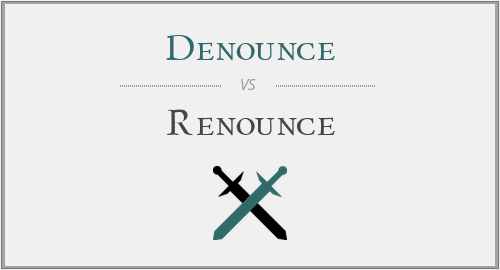Denounce” and “renounce” are only different due to their first letters. This spelling difference is also often not remarked during the pronunciation of these words, which becomes an important reason why they are confused easily and frequently misspelled, used in the wrong contexts.
It’s important that you don’t confuse these words, because they have different meanings and can completely change the message of your communication. So, it’s essential to understand what each word refers to. This is what we’re discussing in this article!
Denounce vs. Renounce
Starting with their similarities, apart from the fact that they are spelled almost identically, “denounce” and “renounce” both function as verbs. In addition to this, both of them are used when making an affirmation or claiming something in public. They are used when officially accepting or saying something.
But that something that is claimed officially is different from “denounce” to “renounce”, and this makes it important that you understand their definition. “Denounce” officially claims something, while “renounce” is making an acceptance in public of something else. The meanings, therefore, of “denounce” and “renounce” are completely different, despite their several similarities.
When do we use “denounce”?
“Denounce” refers to the action of publicly criticizing or accusing something or someone of something. It’s used in a negative way, underlining some bad aspects about someone or something, in front of a public.
Example: After everyone will find out about their previous actions, people will certainly denounce them as criminals. – “denounce” refers to publicly accusing someone of something.
When do we use “renounce”?
“Renounce” is used when officially saying that you don’t want to do/have/own/get involved into something anymore, or when you simply claim, publicly, that you no longer have any rights upon something. It’s actually a great synonym for “give up”.
Example: You will have to renounce all rights to the throne of this kingdom, if you decide to leave and marry the enemy’s child. – “renounce” defines the action of “giving up”, or officially claiming that one has no rights of ownership upon something anymore.
Conclusion
Although “denounce” and “renounce” have numerous similarities in their spelling, pronunciation, functions and usage, they define completely different concepts and confusing them will always result in a misspelled and confusing message. Make sure you remember “denounce” refers to accusing someone/something, while “renounce” refers to giving up on something. It’s that simple.





Have a discussion about this article with the community:
Report Comment
We're doing our best to make sure our content is useful, accurate and safe.
If by any chance you spot an inappropriate comment while navigating through our website please use this form to let us know, and we'll take care of it shortly.
Attachment
You need to be logged in to favorite.
Log In